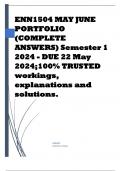ENN1504 MAY JUNE
PORTFOLIO
(COMPLETE
ANSWERS) Semester 1
2024 - DUE 22 May
2024;100% TRUSTED
workings,
explanations and
solutions.
ADMIN
[COMPANY NAME]
,QUESTION 1: MINUTES OF A MEETING BACKGROUND The performance
of students at the University of the South, an open distance and e-learning
institution, is on the decline because students submit assignments which are
not original; they simply copy and paste answers generated by Chatbots,
using artificial intelligence. A Teaching and Learning Ad hoc Committee in
which academics, administrators and students are represented, has been
constituted. The committee held a meeting to deliberate on the dynamics of
relying on chatbots when writing assignments by the students. ENN1504
MAY/JUN 2024 Page 4 of 10 INSTRUCTIONS Below is a transcript (exact
words written down) of what was said under the relevant agenda item under
which the matter of students’ relying on the chatbots when writing
assignments was discussed. As the minuting secretary of the Teaching and
Learning Ad hoc Committee, it is your duty to take minutes during meetings.
The matter was discussed under agenda item 4.1. dynamics (benefits and
disadvantages) of relying on chatbots when writing assignments. Write the
minutes for agenda item 4.1 only. This means that the complete format for
minutes is not required. Remember that in taking minutes, we carefully select
and summarise information, and make changes to style and grammar. Note
that you should not record what each person said in turn. You should use the
linear format (in sentences and paragraphs) of writing minutes. Your minutes
should be 1 page in length. TRANSCRIPT Prof Song (Chair): Ladies and
gentlemen, now that we are done with the issue of supplementary
examinations, let us now turn our attention to the declining students’
performance caused by academic dishonesty. There is a growing concern
from academics who are forced to fail assignments which lack originality.
Therefore, the purpose of this meeting is to share with student representatives
what their peers are doing while preparing their assignments, and how their
practices result in poor academic performance. Let me give this opportunity to
Dr Sibeko who will address you on behalf of lecturers; she has been collating
information about assignment contents from her peers and analysing trends
that are emerging. Dr Sibeko: Thank you very much, Chair, and greetings to
colleagues and students. In our previous Teaching Learning Committee
meeting, we decided to form this special committee not only to share but also
to educate students about dynamics of relying on chatbots when writing and
presenting their assignments. We noted that in ENN1504 MAY/JUN 2024
Page 5 of 10 modules like Practising Workplace English and some literature
modules, students are failing to respond creatively to the background
information and scenarios given. Instead of engaging the context to come up
, with original responses, students tend to rely on the internet and Artificial
Intelligence (AI) to generate answers and essays to literary questions. While
this may appear to be a quick solution, it must be noted that academics are
specialists in their modules; they are able to easily detect when the style of
writing is changing from one paragraph to the next - or when the answer is not
original. It looks like Nthabiseng wants to ask something already. Can I finish,
Chair? Prof Song: Dr Sibeko, let’s allow her to speak. Nthabiseng, can you be
brief for now? The doctor has not finished yet. Nthabiseng: Thanks, Prof. I just
wanted to highlight that saying academics are here to educate us about
chatbots is rather patronising. I think as student representatives, we are here
to share our opinions on the matter as much as academics are here to share
theirs. We are not attending this meeting in our personal capacities; we are
leaders of students. Dr Sibeko: My apologies, Nthabiseng and other student
leaders. The point I was making was that students need to adapt their ways of
using chatbots for assignments because if they don’t, they will keep failing
these modules. Therefore, by saying ‘educate’, I mean there must be a
change in behaviour and attitude. Nthabiseng: (Nods her head in agreement)
Dr Sibeko: Back to the issue at hand, some students simply copy and paste
answers generated by chatbots. In the process, they forget that assessors
expect answers that accurately align with the scenarios given. While robots
like ChatGPT can generate human-like answers and interpretations, there are
nuances in a text that only humans can subtly communicate. Thabang: As a
student leader, I am of the view that our respectable academics must help
students navigate generative AI with more wisdom than to threaten us with
failure. This is an information age, ENN1504 MAY/JUN 2024 Page 6 of 10
and students are digital natives. Help us use these platforms ethically, like we
do acknowledge other sources we cite from time to time. Prof Song: Thank
you, Dr Sibeko. I think we are heading in the right direction. Indeed, Thabang,
the academics want to share some insights about more dynamics that you
need to be aware of as you use artificial intelligence. You are correct to say
there is no way we can separate today’s students from the internet. It is in
their veins. Colleagues, let us have more inputs. Dr Smith: Thank you, Chair.
Students can use chatbot technology to enhance learning, instead of copying
answers. Because the technology is generative, students can compare their
original answers to the ones they generate through AI. In this way, they would
be able to get a second opinion against which they can measure their own
output. I call it an ‘opinion’ because students must have confidence in their
own effort and understand that their first draft is work in progress.




